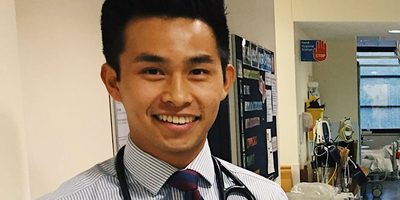
Meet Dr Brendon Neuen, Senior Research Fellow, Renal and Metabolic Program, The George Institute
Dr Brendon Neuen is a Staff Specialist Nephrologist and Director of the Kidney Trials Unit at Royal North Shore Hospital and Senior Research Fellow at The George Institute for Global Health, Australia. He graduated in medicine at James Cook University with 1st Class Honours and an Academic Medal; holds a Masters in Global Health and Epidemiology from the University of Oxford where he was fully funded by a Clarendon Scholarship and received the prize for the top ranked dissertation; and a PhD from the University of New South Wales with the Faculty Award for outstanding contribution to research. He is a Fellow of the Royal Australasian College of Physicians and a Fellow of the American Society of Nephrology.
Tell us a bit about yourself – where did you grow up, what did you enjoy, what was the path to your current role?
Around the time I was seriously considering studying medicine, I was really inspired by Rowan Gillies – another Sydneysider – who in 2004 was elected the youngest ever International Council President of the Nobel Prize winning Médecins Sans Frontières. So as a medical student, I organised a national global health conference and was involved in a range of public health initiatives – thinking I’d follow Dr Gillies path into field work. Instead, during my early clinical training in North Queensland, I was struck but the burden of undertreated diabetes and kidney disease, particularly in Indigenous Australians, which inspired me to specialise in nephrology.
Over the last decade, I completed my physician training, undertook a Masters in Global Health and Epidemiology at the University of Oxford, a PhD at The George Institute with Professor Vlado Perkovic, and am completing a post-doctoral fellowship at Brigham and Women’s Hospital, Harvard Medical School.
Back in Sydney, I am a Staff Specialist Nephrologist and Director of the Kidney Trials Unit at Royal North Shore Hospital and Senior Research Fellow at The George Institute. So, although I’m not doing field work like I originally dreamed, the nature of my research means that I work every day with colleagues from all over the world… it’s interesting, to me at least, that whilst my day-to-day work is entirely different to what I envisioned 15 years ago, that global perspective has remained a big theme of my work and the reason I came to the George in the first place. Of course, it goes without saying that I’ve been extremely lucky throughout my career and had incredible mentors and colleagues – in Sydney, Boston and elsewhere – who continue to inspire me every day.
You were recently recognised with the Paul Dudley White Award from the American Heart Association – tell us what the research behind your winning abstract means for people with diabetes.
People with diabetes and kidney disease face a very high lifetime risk of not only kidney failure but cardiovascular events, particularly heart failure. In the past 5 years, multiple new medicines have been shown in clinical trials to reduce the risk of cardiovascular and kidney disease, but what the benefit might be of combining them are uncertain.
We conducted a major study using data from 10 large clinical trials of 3 newer medicines to estimate what the long-term benefits might be with combined use of these medicines in people with diabetes and kidney disease.
We found that combination treatment with these medicines has the potential to afford approximately 3-5 additional years free from cardiovascular and kidney disease. Given the large and growing burden of diabetes worldwide, our work highlights major opportunities to improve outcomes in people with diabetes and kidney disease with combination use of these medicines.
Our findings were published simultaneously in Circulation, one of the world’s leading cardiovascular medicine journals, to coincide with the presentation of the results at the American Heart Association meeting.
The theme for World Diabetes Day on November 14 is 'Empowering Global Health' - what is the biggest change to global health you would like to see through your work?
In the past 5-10 years, we have made incredible advances with large-scale clinical trials that have identified multiple newer medicines that can reduce cardiovascular and kidney disease in people with diabetes. Without doubt these medicines have the potential to be completely transformative for people with diabetes – but only if those who need them can receive them.
I would love to see a greater global focus on implementation science and health equity in diabetes and kidney disease– identifying gaps in care, better understanding the barriers to uptake of these medicines, and testing strategies to increase their use for the people who need them most. Our research is increasing focused on this challenge, and I’m excited to see what we can achieve.
What do you do to relax/when you’re not working?
My first love was music, and so to relax I play guitar - jazz and blues mostly - although it is increasingly hard to find the time. And while I’ve never been a big hiker, my wife’s love of the outdoors has rubbed off on me a little bit – we enjoy taking the kids out for long bushwalks whenever we can!


